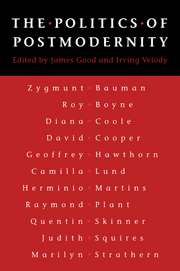Book contents
- Frontmatter
- Contents
- Acknowledgements
- Notes on contributors
- 1 Introduction: postmodernity and the political
- Part I Modernity and its vicissitudes
- Part II The critique of modernist political thought
- Part III Technology and the politics of culture
- 9 Technology, modernity, politics
- 10 Surrogates and substitutes: new practices for old?
- 11 Postmodernism, the sublime and ethics
- Index
9 - Technology, modernity, politics
Published online by Cambridge University Press: 05 June 2012
- Frontmatter
- Contents
- Acknowledgements
- Notes on contributors
- 1 Introduction: postmodernity and the political
- Part I Modernity and its vicissitudes
- Part II The critique of modernist political thought
- Part III Technology and the politics of culture
- 9 Technology, modernity, politics
- 10 Surrogates and substitutes: new practices for old?
- 11 Postmodernism, the sublime and ethics
- Index
Summary
In an extraordinarily influential article the historian of medieval science and technology Lynn White (1967) attributed to Christianity, specifically Latin Western Christianity, the basic legitimation for the technological drive of the West towards the ‘domination of nature’. The very considerable scholarly literature triggered by this article has shown that White's provocative blanket indictment of the alleged biblical sanctions for the technological domination of outer nature was too sweeping. Within Western Christianity various strong theological traditions warrant a wide variety of attitudes towards the exploitation of natural resources and the limits of anthropocentric considerations in the appropriation of non-human forms of life. Even whilst using the idiom of ‘domination of nature’, traditions of stewardship and co-operation with nature have been quite persistent and sustained by good theological authorities. Christian teachings have been and continue to be manystranded in their theological prescriptions on nature, technology, animals, biomedical ethics, etc.
By contrast, references to the ‘domination of nature’ in sociological literature have generally been rather undifferentiated and the underlying attitudes are widely called, quite interchangeably, Promethean or Faustian (the influence of the Frankfurt School has been quite significant in bringing about this conflation). This chapter argues that invocations of the ‘domination’, ‘mastery’ or ‘conquest’ of nature in nineteenth- and twentieth-century social thought have by no means carried invariably the same implications. It attempts to bring out the sharp differences between two ideal-typical traditions, the Promethean (particularly marked in the wake of the French Revolution) and the Faustian (culminating in the work of the single most influential contemporary philosopher of technology, Heidegger).
- Type
- Chapter
- Information
- The Politics of Postmodernity , pp. 150 - 181Publisher: Cambridge University PressPrint publication year: 1998
- 6
- Cited by



